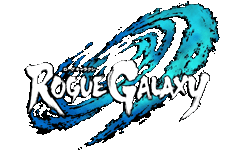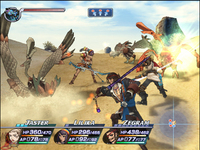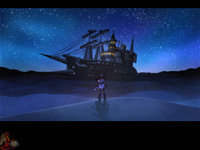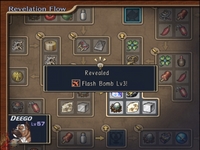|
|

|
BATTLE SYSTEM
|

|
INTERACTION
|

|
ORIGINALITY
|

|
STORY
|

|
MUSIC & SOUND
|

|
VISUALS
|

|
CHALLENGE
|
Mostly Easy
|
COMPLETION TIME
|
45-100 hours
|
|
OVERALL
4.0/5
|
Rating definitions
|
|
|
For Rogue Galaxy, the journey from Japan to North America was long and difficult, paved with trials that transformed the game. Though this cel-shaded sci-fi pirate RPG plundered the pockets of nearly 400,000 Japanese gamers, the developers felt that it was incomplete. They used player criticism and their own creative desires to reshape Rogue Galaxy for its North American debut. They rearranged dungeons and towns, fine-tuned the battle system, and added new voice dialogue and bonus content. The final product has flaws, but it is still an enjoyable experience.
After a vicious attack by beasts on his hometown and a comical case of mistaken identity, Jaster Rogue ends up in the company of space pirates. This sets the tone for Rogue Galaxy: a blend of sci-fi action and comedy. There are many light-hearted and comical moments, largely due to characters having funny voices and clever lines. Character development is rather superficial, but Rogue Galaxy does not strive to be a serious epic. But while some aspects of the story are fairly original and intriguing, some of the plot twists are not, and this drags the story down.
Rogue Galaxy is an action RPG, but combat is more than just hack-and-slash. Each character has a main weapon and an offhand weapon -- usually one for close melee and one for ranged attacks. The player controls one character, while the others are controlled by AI. Slashing everything with the melee weapon is amusing for a while, but it's a bad tactic. Besides, there are other fun ways to fight: special abilities, shooting, kicking, jumping and backflipping, smashing debris on the field or picking it up and throwing it at enemies, or even picking up the enemies themselves and throwing them at walls or each other. Fighting is only limited by the need to reload weapons, dodge attacks, and refill the action meter.
 Don't just hack and slash. Shoot, throw, jump, kick, and flip!
Don't just hack and slash. Shoot, throw, jump, kick, and flip!
|
|
Players also have to give orders to the two AI-controlled characters while managing their overall tactics. Allies will call out suggestions, such as a healing potion or a special move, and the player must quickly select an option or ignore them. Victory requires team supervision and sometimes breaking enemies' special defenses. The problem is that the AI can sometimes be a bit silly in its suggestions, such as calling for a huge party buff when only one weak monster remains. AI customization is a bit too limited. Players can temporarily turn off unwanted moves to keep allies from suggesting them, but the general team tactics lack the diversity needed in certain battles. An option to use ranged attacks only would have been very helpful in cases where monsters hit hard or spew fire.
In addition, the player may control any of the seven characters; each one has a different set of weapons with unique timing, and this allows the player to choose which one suits his or her playing style. For example, Jaster is easy to manage and sometimes fun to use; he can knock an enemy backwards with rapid-fire pistol blasts then leap in with his sword for the kill. Kisala uses daggers and kicks in an acrobatic style. Lilika is suited for ranged combat, and Deego presents a challenge with his slow-swinging axes and jarring gatling guns.
 Take me out to the black...tell them I ain't comin' back...
Take me out to the black...tell them I ain't comin' back...
|
|
As with previous Level 5 titles, Rogue Galaxy has cel-shaded graphics that enhance the cartoon-like nature of the game while smoothly blending with star fields, structures, and landscapes. Each character has changeable outfits and dozens of weapons to collect, which means that the cast constantly changes appearances on the field and in cutscenes. Aside from the black borders making noses look odd at angles, the cel-shading is quite lovely. Although Rogue Galaxy has colorful and stylish visuals, dungeon layouts are terribly repetitious with a handful of design elements strung together like beads. Characters will pass the same rock formation, lava pool, or room layout many times in a dungeon, making exploration a bit dull. Towns occasionally suffer from the same trouble as well, although to a lesser extent, and they make up for it with their outstanding landmarks.
Rogue Galaxy also features a quality audio experience to accompany the mostly pleasing visuals. The soundtrack fits the game quite well. Neat guitar tunes support free-spirited and sometimes chaotic flute melodies, and patches of strings, brass, and vocals add haunting or suspenseful tones as needed. Aside from "The Labyrinth," none of the tracks are breathtaking, but they tend to blend nicely with the settings. The only real negative is that the theme song, "Dreaming My Way Home," is introduced during a cutscene with spoken dialogue that overwhelms the lyrics and events that contrast sharply with the wistful melody.
The voice acting, however, is well above average. The cast includes significant talents like Steve Blum, Crispin Freeman, and Kari Walhgren, and almost every line is delivered in a credible manner with good timing. Comical characters do not come off as too cheesy, and regular characters rarely sound stiff. Steve Blum's performance as Zegram is particularly outstanding; there's just something genuinely gritty about the way he spits "Piss off!" at enemies. Greg Ellis also delivers a charming performance as Simon, an odd but sweet fellow with a Scottish accent. The Live Talk system shows off a lot of the voice acting. Characters frequently and randomly comment on story events and current situations or offer advice and encouragement. Taking an incorrect route or idling for too long will cause allies to complain or remind the leader of an urgent goal. Although this becomes annoying at times, it adds a bit of realism and personality to the party's travels.
 Revelation Flow: the reason why the rum is gone.
Revelation Flow: the reason why the rum is gone.
|
|
Rogue Galaxy attempts to deliver easy interaction by offering a clean menu and plenty of system customization options, such as toggling the camera position, inverting camera controls, and switching off the sometimes annoying Live Talk system. Battle controls are quite easy to handle once the player adjusts to following the multitasking action. The main hangup is occasional lag, but this is sometimes due to review copy glitches and it may not exist in the final retail version. Walk-in cutscenes sometimes take a few seconds to load, and there are brief one to two-second delays in opening the menu during battles later in the game. This pauses combat anyway, so it is not as if it seriously works against the player.
Generally, Rogue Galaxy is quite easy. Save points are very frequent, dungeons are mostly long hikes through branching paths, and objectives are never difficult. The learning curve for the battle system isn't very steep, but a few of the bosses require creative tactics and many regular enemies can squash a couple of party members in a matter of seconds.
The main story of Rogue Galaxy takes approximately 45 to 50 hours to complete, but there's a lot more to do. In fact, much of the real gameplay is optional: two bonus areas, wanted monster hunts, the game-within-a-game Insectron stadium, and enough item collection and creation to make an obsessive RPG completionist swoon in ecstasy. Rogue Galaxy actually places a lot of emphasis on gathering items. They fill out the character growth system, serve as materials for other items, spawn wanted monsters, change the appearance of a character, or decorate the player's rare item section of the menu.
A significant aspect of Rogue Galaxy is "discovery through creation," as it features two excellent forms of item development. One is a strange amphibian who can create and upgrade weapons via mastication. The other is an assembly line factory. Players must find blueprints, then fashion assembly lines from a collection of materials, refining machines, conveyor belt tubes, and power cords. Each plan is a puzzle; players need to figure out the correct material refinement process, the proper timing for conveyor belt length so that items arrive at the assembler at the same time, and efficient use of the limited supply of power cords. It's challenging, aggravating, and fun.
Rogue Galaxy is a refined v2.0, and while the changes do not raise it to the heavens, it is still a worthwhile game that surpasses a sizeable portion of current RPGs. Though the story is lacking, the game still has much more to offer: excellent graphics and voice acting, a rapid-fire battle system with plenty of activities, and extensive item collection and creation.
Review Archives
|









